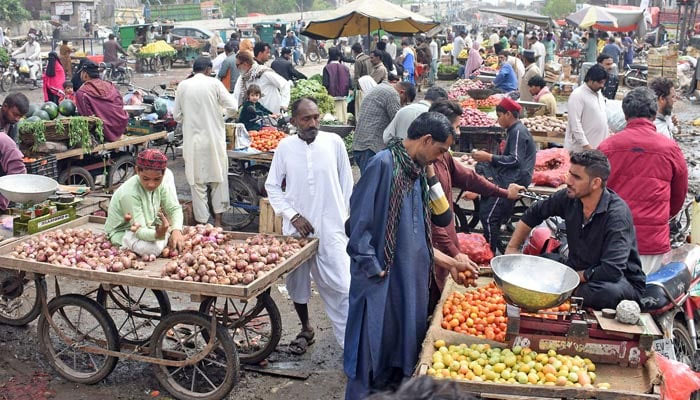Weekly inflation inches up 4.92pc
ISLAMABAD: Pakistan’s weekly inflation inched up again, reaching 4.92 per cent year-on-year for the week ending November 21, compared to 4.16 per cent the previous week.
The short-term inflation, tracked by the Sensitive Price Indicator (SPI), which measures the cost of essential items such as food and household necessities, saw a 0.67 per cent increase from the previous week, according to data released by the Pakistan Bureau of Statistics (PBS) on Friday.
This comes after the SPI hit a six-year low last week, which was 4.16 per cent, and reflects a continued decline from double-digit inflation rates seen in recent years. In May 2023, the SPI had peaked at a staggering 48.35 per cent. Notably, this marks the second consecutive week in which the SPI has fallen to single digits since February 2020.
SPI data, which is collected from 17 cities and monitors the prices of 51 essential items, showed a mixed trend. Of the 51 items, 17 registered price increases, 11 saw decreases, and 23 remained unchanged compared to the previous week.
Among the items with the largest week-on-week increases, ladies’ sandals saw a sharp rise of 56 per cent, while tomatoes became 21 per cent more expensive. Other key items such as potatoes and garlic rose by 3.8 per cent and 3.4 per cent, respectively, followed by eggs, which increased by 3.2 per cent, and vegetable ghee, which saw a 2.0 per cent rise. Mustard oil and onions also saw modest price hikes of 1.3 per cent and 1.0 per cent, respectively.
Some items experienced price reductions. Chicken prices dropped by 3.0 per cent, gram pulse fell by 1.7 per cent, and LPG prices decreased by 0.8 per cent. Masoor pulse and other staples like rice basmati broken, sugar, wheat flour, and rice IRRI-6/9 also saw minimal declines of less than 0.5 per cent each.
Inflation affected households differently, with the lowest income group (earning less than Rs17,732 per month) facing a 0.91 per cent weekly increase in prices. In contrast, households earning more than Rs44,175 monthly saw a relatively smaller rise of 0.61 per cent. On a year-on-year basis, inflation rose by 3.44 per cent for the lowest income group and 5.41 percent for the highest income group. Compared to the same week last year, several essential items registered significant price hikes. Notably, ladies’ sandals surged by 75 per cent, while gram pulse and moong pulse saw increases of 71 per cent and 39 per cent, respectively. Powdered milk prices rose by 26 per cent, beef by 24 per cent, and onions by 21 per cent. Other items such as tomatoes, garlic, and gas prices for the lowest consumer slab also saw notable hikes of 20 per cent, 16 per cent, and 15.5 per cent, respectively.
However, some items have seen a decrease in prices compared to last year. Wheat flour prices fell by 35 per cent, while powdered chilies dropped by 20 per cent. Diesel and petrol prices declined by 14 per cent and 12 per cent, respectively. Other items like Lipton tea, basmati rice, and bread also became cheaper, with decreases of up to 8.0 per cent.
-
 What You Need To Know About Ischemic Stroke
What You Need To Know About Ischemic Stroke -
 Shocking Reason Behind Type 2 Diabetes Revealed By Scientists
Shocking Reason Behind Type 2 Diabetes Revealed By Scientists -
 SpaceX Cleared For NASA Crew-12 Launch After Falcon 9 Review
SpaceX Cleared For NASA Crew-12 Launch After Falcon 9 Review -
 Meghan Markle Gives Old Hollywood Vibes In New Photos At Glitzy Event
Meghan Markle Gives Old Hollywood Vibes In New Photos At Glitzy Event -
 Simple 'finger Test' Unveils Lung Cancer Diagnosis
Simple 'finger Test' Unveils Lung Cancer Diagnosis -
 Groundbreaking Treatment For Sepsis Emerges In New Study
Groundbreaking Treatment For Sepsis Emerges In New Study -
 Roblox Blocked In Egypt Sparks Debate Over Child Safety And Digital Access
Roblox Blocked In Egypt Sparks Debate Over Child Safety And Digital Access -
 Savannah Guthrie Addresses Ransom Demands Made By Her Mother Nancy's Kidnappers
Savannah Guthrie Addresses Ransom Demands Made By Her Mother Nancy's Kidnappers -
 OpenAI Reportedly Working On AI-powered Earbuds As First Hardware Product
OpenAI Reportedly Working On AI-powered Earbuds As First Hardware Product -
 Andrew, Sarah Ferguson Refuse King Charles Request: 'Raising Eyebrows Inside Palace'
Andrew, Sarah Ferguson Refuse King Charles Request: 'Raising Eyebrows Inside Palace' -
 Adam Sandler Reveals How Tom Cruise Introduced Him To Paul Thomas Anderson
Adam Sandler Reveals How Tom Cruise Introduced Him To Paul Thomas Anderson -
 Washington Post CEO William Lewis Resigns After Sweeping Layoffs
Washington Post CEO William Lewis Resigns After Sweeping Layoffs -
 North Korea To Hold 9th Workers’ Party Congress In Late February
North Korea To Hold 9th Workers’ Party Congress In Late February -
 All You Need To Know Guide To Rosacea
All You Need To Know Guide To Rosacea -
 Princess Diana's Brother 'handed Over' Althorp House To Marion And Her Family
Princess Diana's Brother 'handed Over' Althorp House To Marion And Her Family -
 Trump Mobile T1 Phone Resurfaces With New Specs, Higher Price
Trump Mobile T1 Phone Resurfaces With New Specs, Higher Price




